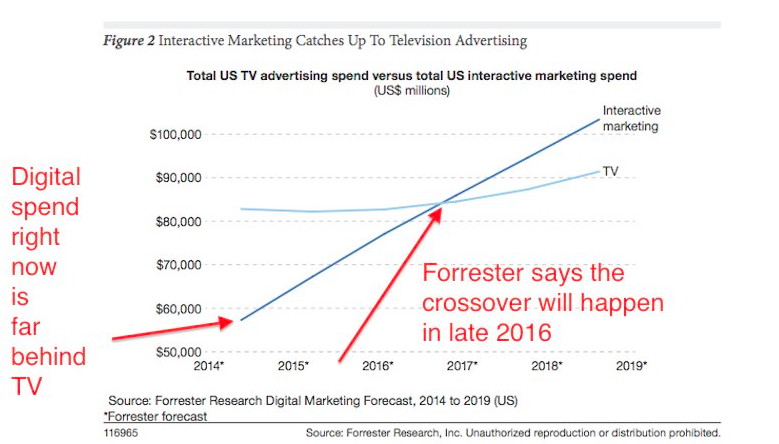Even though I am a diehard digital marketer, TV will not die in 2016. The prediction says that marketers will spend more money on digital than TV starting in 2016, but much like the calls for the "death of radio" when TV came along, I think that TV will continue to be a very effective medium for reaching and influencing a large segment of the population long after this revenue transformation occurs.
Consumers switched their dominant media preference from TV to digital in the fourth quarter of 2013. Now the evidence indicates that advertisers will follow suit. Agreed.
But TV isn't going anywhere (unless the broadcast industry kills it). According to the article - It's worth pointing out that this evidence doesn't point toward the death of TV networks and broadcasters (they sell a lot of digital ads too), but that marketers are increasingly pivoting their spend to focus far less around the 30-second digital spot. So it's the end of TV's dominance, rather than the end of TV.
In a lot of ways digital spending will follow the same path as TV. For years one of the problems with TV marketing has been the decline in ratings among the broadcasters. Viewers simply have more choices (channels) to watch than they did 20 years ago. The ratings decline did not happen over night. There was no new "channel" that interrupted consumer's behavior. It was the death by a thousand paper cuts. Here is a chart showing the ratings of the highest rated show each season for the previous 50 years. Do you see the trend?
Ironically, digital marketers are experiencing a similar problem. The proliferation of the shear number web sites and social media sites makes the "ratings" or audience penetration of a single site smaller every year. Where do we put this new found money in a rapidly expanding universe and still see a return on investment for our clients? This helps explain the rapidly rising interest in programmatic buying. Chase the audience, not the web site. But click fraud will help quell this trend until we find a way to deal with it.
I'll stop here and address this issue later. For now, TV is still going to work with for a lot of advertisers. Not as well as it may have 20 years ago, but what does?


No comments:
Post a Comment